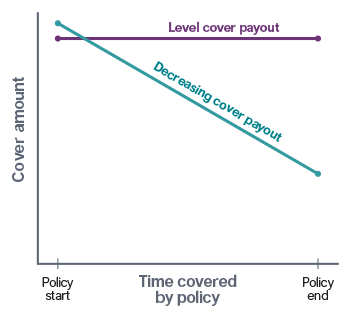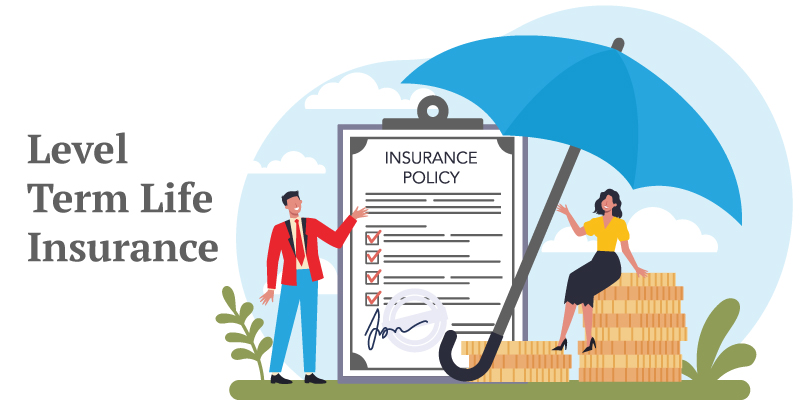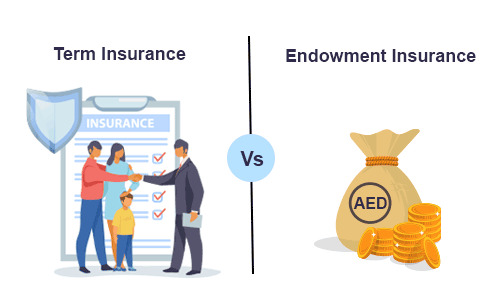Understanding the Slide of Decreasing Term Insurance
In the diverse insurance landscape of the UAE, you can find different types of term insurance plans catering to distinct requirements and budgets. From level term and increasing to decreasing, convertible, and even return of premium term insurance plans, you can certainly find a wide range of options.
With that said, each type of term insurance carries a unique set of advantages and features to fit each individual's specific requirements. Among these options, the decreasing term insurance plan stands out for its distinctive characteristics.
Best Term Insurance Plans in UAE
Some of the best Term Insurance quotes in UAE & Dubai are:
Table of Content
In this article, we will explore the nuances of the decreasing term life insurance plan, highlighting its salient features, benefits, and more.
What is Decreasing Term Insurance?
Decreasing term insurance is a specialised variant of term life insurance. While traditional term life insurance offers coverage for a specified period, say 20 years, with consistent premiums and a fixed death benefit throughout its tenure, decreasing term insurance operates a bit differently.
Under a decreasing term insurance plan, both the death benefit and the associated premiums reduce over the policy's life. This decline is pre-established at the time of policy inception and can be aligned to a predetermined schedule or tailored to meet specific agreements between the insurer and the policyholder.
In essence, with a decreasing term insurance plan, the coverage and costs adjust downwards over time, making it a fitting choice for individuals with evolving financial commitments.
Who Should Buy Decreasing Term Insurance?
- Homeowners with Mortgages: Individuals with outstanding mortgage payments can benefit immensely from these plans. The insurance plan can be timed to expire around the same time the mortgage is fully paid, ensuring that a decreasing liability is matched with decreasing coverage.
- Individuals with Declining Financial Obligations: If you foresee your financial obligations lessening over the years — whether due to children becoming self-sufficient or loans being paid off — this type of insurance can be a good match.
- Budget-Conscious Seekers: For those looking for life insurance coverage that aligns with their diminishing financial obligations and also offers the benefit of decreasing premiums, this is an apt choice.
- Short-Term Debt Holders: People holding large short-term debts, which they expect to repay in the foreseeable future, can use decreasing term insurance as a safety net for the interim period.
How Does Decreasing Term Insurance Work?
Decreasing term insurance is a specific form of term life insurance designed to offer coverage for a pre-defined duration, typically ranging between 5 and 30 years.
When obtaining this policy, the policyholder selects the tenure of the policy (commonly between 5 to 30 years) and establishes the initial death benefit. Subsequently, this death benefit shrinks by a set percentage either monthly or annually, depending on the policy's design.
If an unfortunate event leads to the policyholder's demise within the policy's active term, the beneficiaries can claim the death benefit, which corresponds to the value at that specific point in time. If the policyholder outlives the term, the death benefit would have decreased to nil, signalling the end of the coverage.
Example of Decreasing Term Insurance
Consider a non-smoking 30-year-old male who opts for a 15-year decreasing term policy with a starting coverage of AED 200,000. This policy, designed to align with a mortgage amortisation schedule, might cost him a consistent monthly premium of AED 25.
Despite the static nature of the premium, the death benefit reduces over time. This reduction is justified — as the insured individual gets older, the insurer's risk elevates, and this rising risk is counterbalanced by the diminishing death benefit.
On the other hand, a permanent policy offering the same initial coverage of AED 200,000 might necessitate monthly premiums of AED 100 or even higher. Although certain universal or whole-life policies offer flexibility in face amounts, especially when used for loans or advances, they predominantly maintain consistent death benefits.
Benefits of Decreasing Term Insurance Plan
Let's delve into the core benefits that make decreasing term insurance plan a preferred choice for many –
- Budget-Friendly Solution: Decreasing term insurance plans are often more cost-effective than other life insurance policies. As the coverage amount diminishes over time, so do the premiums. This makes it an affordable choice for those keen on maximising value without compromising protection.
- Adaptable to Changing Needs: The inherent flexibility of decreasing term insurance allows policyholders to tailor the plan according to their specific requirements. This means as their liabilities reduce over time, their coverage adjusts accordingly, ensuring that they aren't over-insured or paying for unnecessary coverage.
- Optimal Protection When Needed Most: Often referred to as ‘prime coverage’, these policies ensure that you have maximum protection during the early stages when liabilities or responsibilities are at their peak. As these obligations gradually reduce, so does the coverage, which aligns perfectly with the policyholder's changing requirements.
- Addressing Financial Liabilities: Decreasing term insurance is also a source of relief for those with significant financial obligations like mortgages or loans. It ensures that in case of an unexpected event, the remaining debts can be settled, thereby shielding the family from financial burdens.
When Should I Buy a Decreasing Term Insurance Plan?
The ideal time to invest in a decreasing term insurance plan often aligns with significant life milestones or financial commitments that diminish over time. If you've recently ventured into homeownership with a mortgage, initiated a sizeable business loan, or perhaps have other substantial debts that you anticipate paying down over the years, this type of insurance is apt for you.
It's particularly beneficial when you envision your financial obligations tapering off in the foreseeable future. Additionally, those in the early stages of family planning, foreseeing eventual financial independence of their offspring, might also find decreasing term insurance to be a fitting protective measure.
Essentially, when you expect your long-term liabilities to decrease and wish for your coverage to reflect that trajectory, that's the right time to consider a decreasing term insurance plan.
Refer to the next section of the article to know more about the decreasing term insurance plan through some frequently asked questions.
Frequently Asked Questions
Ans: Decreasing term insurance is a specific type of term life insurance where the death benefit or cover amount reduces over the life of the policy. This reduction often aligns with a predetermined schedule, ensuring that you're not over-insured as your financial liabilities decrease.
Ans: Decreasing term insurance is particularly beneficial for individuals with diminishing financial obligations like a mortgage or large loan. Since the death benefit reduces over time, premiums are often lower than those of a standard term policy, making it a cost-effective choice for those whose main concern is covering declining debts.
Ans: Premiums for decreasing term insurance are generally determined by the initial death benefit, the term of the policy, the rate at which the benefit decreases, and the applicant's health, age, and lifestyle.
Ans: Similar to other term life insurance policies, if you outlive the term of your decreasing term insurance, the coverage will end and there won't be any payout. It's worth noting that by the end of its term, the policy's death benefit would have already been reduced to zero.
Ans: This depends on the specific policy and the insurance provider. Some decreasing term insurance policies offer a conversion feature, allowing you to switch to a permanent life insurance policy without undergoing a new health assessment. It's essential to read the policy terms or consult with your insurer to understand your options.
More From Term Insurance
- Recents Articles
- Popular Articles







.jpg)
























.png)













